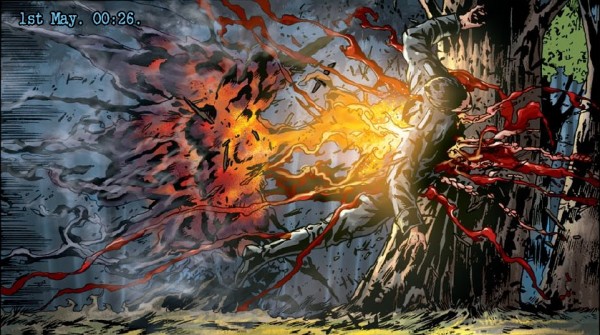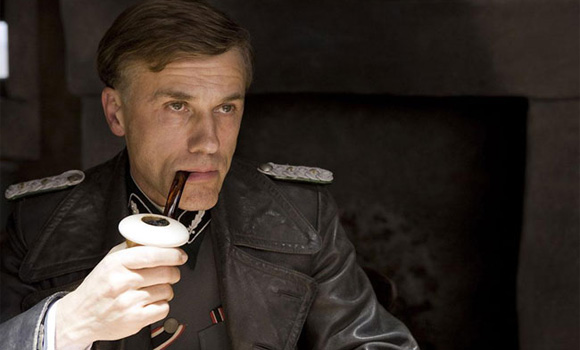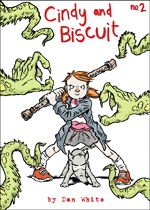A History of Violence – Über, Zero, Pretty Deadly and Three Reviewed
March 17th, 2014
Über #0-10, by Kieron Gillen, Caanan White, Joseph Silver, Kurt Hathaway and Digicore Studios

Kieron Gillen let the mask slip a little at the start, when he positioned this comic as the anti-ASS, as a refutation of Superman’s central place in 20th Century history, in a spiel designed to mark Über out as being a comic free of the sort of self-commentary that defines so many modern superhero comics. “It’s probably the least ironic book I’ve ever written,” he said:
It has nothing to say about superhero comics. In fact, its utter negation of that genre-criticism may be the closest it comes to commentary. I’ve read many books which seem to labour under the delusion that the conception of Superman was the most important moment in the 1930s. This isn’t one of them. My only interest is in how I can use this genre’s conceit to create metaphors to explores aspects of WW2…
This comment, buried as it was in the mix of metatextual soul searching and historical gamesmanship of Über #0’s backmatter, provides the key to understanding the uncanny dynamics of this comic. In attempting to ward off irony and meta-commentary, Gillen negated any possibility of this comic escaping the superhero meta-conversation. Which, it turns out, is actually quite fitting in the end. Carefully researched as Über might be, with everything from troop movements to weather conditions having been taken into account, this WW2 with superheroes fantasy is still a superhero fantasy, and as such it manages the odd trick of destroying both history and genre conventions and reinforcing them at the same time.
In contrast to the carefully composed alternate reality of All Star Superman – with its suggestion of a world where greed, imperialism and mortal panic exist but are never the only options – Gillen and White present an alt-modernity in which the foundational horrors of the mid 20th Century era are all there but louder.
Revenge of the Giant Face
March 12th, 2014

Ah, let’s indulge in some time travel shall we? Let’s go all the way back to September 2009, when Sean Collins had this to say about Quentin Tarantino’s Inglourious Basterds:
It is, in other words, a deliberate assault on the facts surrounding the deaths of millions and millions of people, including the systematic genocide of six million Jews in the Holocaust… It’s morally monstrous and its practitioners are moral monsters.
Oh, wait, shit. That’s not quite right. That’s what Sean C. had to say about Nazi-sympathizing turd-monger Pat Buchanan. Sorry everyone, but problems like this tend to occur when you start to mess around with history, you know?
In order to find what Sean actually thought of Inglourious Basterds we have to go back even further, to August 2009 no less! It was a kinder time, a gentler time, a time where a man could read an essay on the cathartic, history rupturing violence of Tarantino’s latest picture without any danger of stumbling onto this long winded response.
Here’s what Sean actually said about the film:
…Inglourious Basterds may be the punkest movie I’ve seen in I can’t even think how long. Maybe ever. It’s about nothing less than the power of art to destroy evil. It’s about how important it is to love film more than the likes of Hitler hate life. It’s about how movie violence, art violence, art designed as a FUCK YOU, can help you deal with the violence that so terrified Chamberlain’s cohorts and to which Hitler and his cohorts were so indifferent. It’s Woody Guthrie’s “THIS MACHINE KILLS FASCISTS” guitar slogan made literal. It’s a lingering closeup on the bloodlust-saturated eyes of Eli Roth, the beautiful Jewish torture-porn poster boy and enemy of good taste, as he empties a machine gun into the bodies of members of the Third Reich. And it’s a total fucking fantasy. Yet that’s what makes it so vital.

CINDY & BISCUIT no.1 – available now!
April 19th, 2011
From the creator of TERMINUS and INSOMNIA
CINDY & BISCUIT no.1:
Cindy & Biscuit: A violence-prone, fearless little girl and her loyal best friend, who regularly save the world from disgusting aliens, tussle with giant werewolves and have adventures in outer-space.
Or do they?
24 pages of mayhem, angry little girls, loyal small dogs, aliens, werewolves, outer-space, loneliness and the endless horror of school.
(B+W, 24 pages)
£2.50 (+£1.50 p&p)
HEAD OVER TO THE ‘MILK THE CAT’ SHOP AND PURCHASE IT!
While you’re there, check out the SALE on Terminus!
Click below for sample pages…




